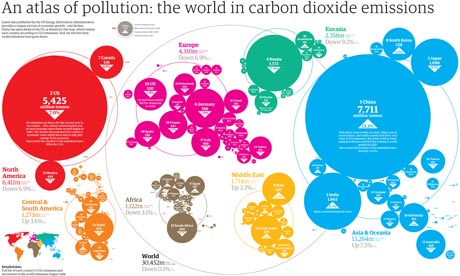Durban Blame And Shame
"Canada will not make a commitment to a second Kyoto period. Our fixation, our commitment, is on Copenhagen and the Cancun Agreement." Canadian Environment Minister Peter Kent

Canada has become the symbol of what is environmentally wrong with the Globe. On Canada's shoulders rests the blame. F-O-R . . . S-H-A-M-E! Small population, in a very large geography. Mind, that large geography is located in the Northern Hemisphere and most of the country becomes, in winter, extremely cold, windy, snowy and needful of using all available energy means to manipulate our interior environment to make it livable for human beings.
Canada is also extremely fortunate in its huge natural reserves of energy resources, from coal and water to oil and gas, even wind and solar power. It is the extractive processes and the delivery and the burning of energy resources for warmth and cooling purposes that give Canada the unsavoury reputation of an energy hog, impacting deleteriously on the environment. Guilty as charged.
We are trying, in our own humble way to remediate the situation. Honestly, truly we are. For it is in our own best interests in both the short- and the long-run to ensure that we expedite as much as possible technologies that our brilliant scientists and engineers are able to visualize and create to enable us to get on with the extraction and burning of fuel in the most energy-efficient way possible. With the least damage to the environment.
We must also get on with the national business of trade to produce employment for Canadians and to enrich the economy, advancing the country's future prospects and prosperity for a growing population. As a wealthy, technologically advanced country, Canada, like its peers, recognizes its obligations to aid and assist the under-developed countries of the world, and this is done with a sense of urgent responsibility.
The current UN climate discussions taking place in Durban, South Africa, have placed Canada in the dunce chair over in the corner, with that large, comical, conical cap hiding its embarrassed grin. Not to say that the Government of Canada is embarrassed, for it is not. It is, however, firm in its opinion that, since Canada is responsible for 2% of global greenhouse gas emissions, the country is pulling its weight.
On the other hand, China's continuing expansion - along with India's energy consumption and that of Brazil, all of whom have growing economies and energy usage, not required to respond to Kyoto -reduction commitments - has offset the reduction in carbon emissions in recession-hit western countries. Canada has, in fact, reduced its total carbon emissions along with Europe, Russia and South Africa.

While the West's industrial output plummeted as a result of its recent recession, global carbon emissions have continued to grow, thanks mostly to China's continuing expansion, along with that of a number of other emerging economies. Emissions in the United States fell to levels unseen since 1995-96, while China's emissions surged with an increase of over 13% since the previous year.
• China emits more CO2 than the US and Canada put together - up by 171% since the year 2000• The US has had declining CO2 for two years running, the last time the US had declining CO2 for 3 years running was in the 1980s
• The UK is down one place to tenth on the list, 8% on the year. The country is now behind Iran, South Korea, Japan and Germany
• India is now the world's third biggest emitter of CO2 - pushing Russia into fourth place
• The biggest decrease from 2008-2009 is Ukraine - down 28%. The biggest increase is the Cook Islands - up 66.7%
But that is only one way to look at the data - and it doesn't take account of how many people live in each country. If you look at per capita emissions, a different picture emerges where:
Now, at Durban, while the heat continues to be on Canada's 'intransigence' in refusing to honour its Kyoto commitments, China claims to be interested in a legally binding agreement to reduce emissions on fossil fuel reductions with conditions; mostly that developed countries log back onto Kyoto and firm up their commitments.• Some of the world's smallest countries and islands emit the most per person - the highest being Gibraltar with 152 tonnes per person
• The US is still number one in terms of per capita emissions among the big economies - with 18 tonnes emitted per person
• China, by contrast, emits under six tonnes per person, India only 1.38
• For comparison, the whole world emits 4.49 tonnes per person
The chief U.S. negotiator is puzzled by the offer; the EU climate commissioner is interested in hearing more; Canada's negotiator commented on China's obvious difficulties meeting last year's commitments. And, yes, Canada is disinterested in signing fresh commitments under the Kyoto Protocol. Japan and Russia are right behind Canada; they're excused, Canada damned.
Labels: Canada, Environment, Political Realities, United Nations

<< Home